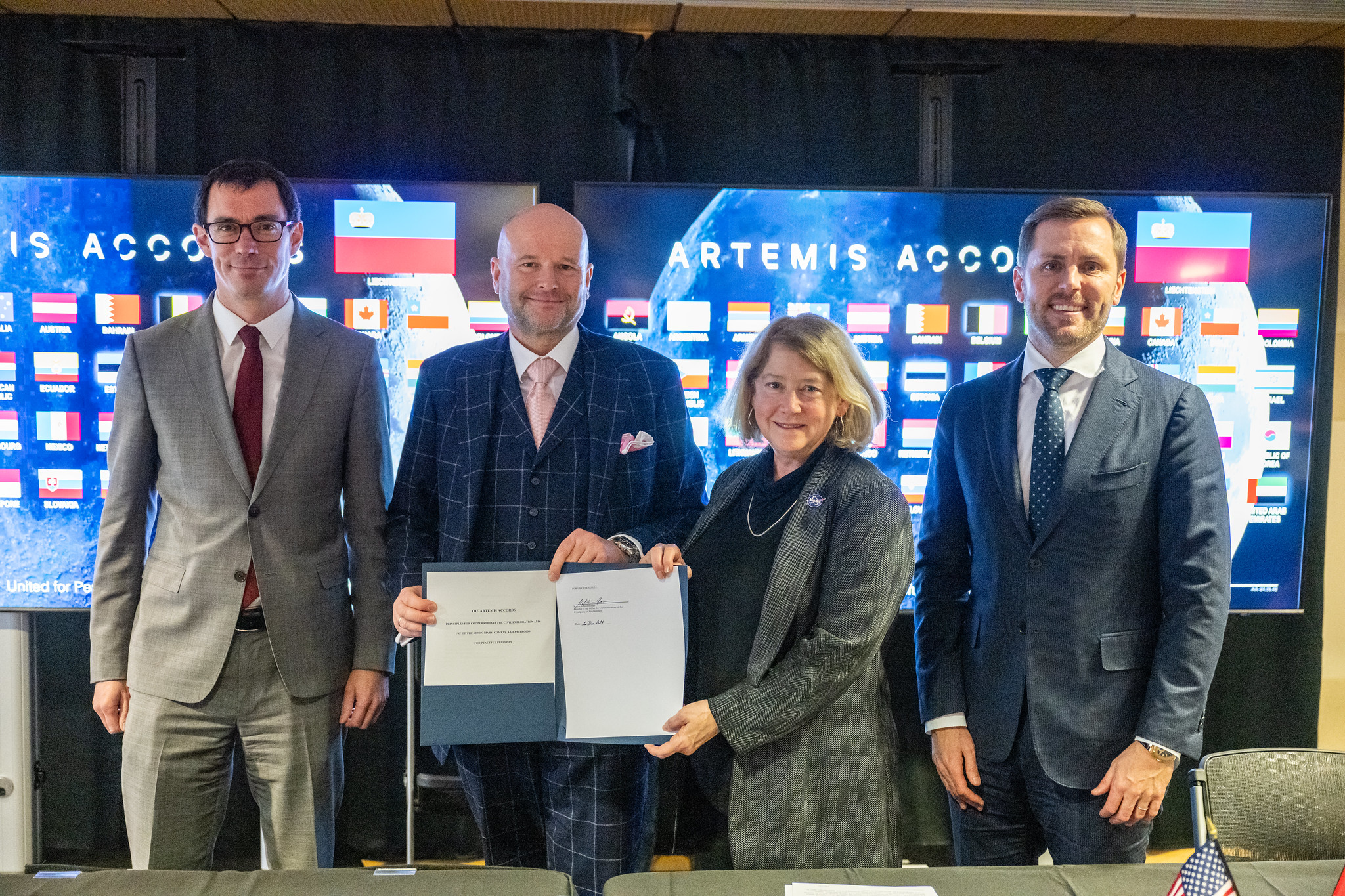Liechtenstein Joins the Global Effort for Peaceful and Sustainable Space Exploration
In a landmark event that underscores the growing global commitment to the responsible and peaceful use of outer space, Liechtenstein has become the 52nd nation to sign the Artemis Accords. The signing ceremony took place on a notable Friday at NASA’s headquarters in Washington, D.C., with Deputy Administrator Pam Melroy hosting the event. This development marks a significant step forward in international cooperation aimed at exploring space in a manner that benefits all of humanity.
Pam Melroy expressed her optimism about this new partnership, stating, "Today, as Liechtenstein signs the Artemis Accords, we take another step forward together, united by the promise of international cooperation and discovery." She emphasized that Liechtenstein’s commitment bolsters the vision of exploring space with peace, transparency, and sustainability as core principles. With each new country joining the Accords, the community gains fresh energy and capabilities, ensuring that the benefits of space exploration are shared globally.
Liechtenstein’s Contribution to Space Exploration
Rainer Schnepfleitner, the Director of Liechtenstein’s Office for Communications, signed the Artemis Accords on behalf of the small yet ambitious nation. The ceremony also saw the participation of Georg Sparber, the Ambassador of the Principality of Liechtenstein to the United States, and Scott Miller, the U.S. Ambassador to the Swiss Confederation and the Principality of Liechtenstein.
Ambassador Georg Sparber highlighted Liechtenstein’s aspirations, noting, "With its participation in the Artemis Accords, Liechtenstein looks forward to advancing space exploration among a strong group of like-minded countries committed to the peaceful use of space for the benefit of all humanity." This reflects Liechtenstein’s dedication to working alongside other nations in fostering a collaborative environment for space exploration.
The Genesis and Expansion of the Artemis Accords
The Artemis Accords were launched in 2020 by the United States, spearheaded by NASA and the U.S. Department of State, in collaboration with seven other initial signatory nations. The Accords lay out a set of principles designed to promote the beneficial use of space resources for humanity. Since their inception, the Accords have garnered widespread support, with signatories now representing roughly a quarter of the world’s countries.
In the year 2024 alone, 19 additional countries joined the Accords, demonstrating a significant expansion in numbers and diversity. The signatories, hailing from every region of the world, have been actively working to build consensus and make substantive progress in implementing the principles outlined in the Accords.
Key Discussions and Recommendations
NASA recently co-chaired the Artemis Accords Principals’ Meeting in October, which brought together representatives from 42 nations. This meeting was pivotal in advancing discussions on the safe and responsible use of space. Important recommendations were agreed upon, focusing on non-interference, interoperability, the release of scientific data, long-term sustainability guidelines, and the registration of space objects. These recommendations are crucial for advancing the implementation of the Accords’ principles.
Foundation of the Artemis Accords
The Artemis Accords are deeply rooted in the existing international legal framework for outer space activities. They draw from the Outer Space Treaty, the Registration Convention, and the Rescue and Return Agreement. Furthermore, they incorporate best practices for responsible behavior in space, which NASA and its international partners have long supported. This includes the public release of scientific data, ensuring that information gathered from space exploration is accessible to all.
Understanding the Technical Jargon
For those who may not be familiar with the technical terms, here’s a simple breakdown:
- Outer Space Treaty: This is an international treaty that forms the basis of international space law. It was opened for signature in 1967 and aims to ensure that the exploration and use of outer space are conducted for the benefit of all countries and that space activities are carried out peacefully.
- Registration Convention: This agreement requires countries to provide details about the space objects they launch, ensuring transparency and accountability in space activities.
- Rescue and Return Agreement: This agreement focuses on the safety of astronauts and mandates the rescue and return of astronauts to their home countries in the event of an emergency in space.
Global Impact and Reactions
The signing of the Artemis Accords by Liechtenstein is a testament to the increasing importance of international cooperation in space exploration. As more countries commit to these principles, the global community strengthens its resolve to use space responsibly and sustainably. This cooperation is crucial in addressing challenges such as space debris, resource management, and the peaceful use of space.
The international community has reacted positively to Liechtenstein’s decision to join the Artemis Accords. Many experts believe that the inclusion of more nations, regardless of their size, adds significant value to the collaborative efforts in space exploration. By pooling resources and knowledge, countries can achieve more significant milestones in space technology and research.
The Road Ahead
With 52 nations now part of the Artemis Accords, the initiative continues to gain momentum. Each new signatory brings unique capabilities and perspectives, enriching the global dialogue on space exploration. As the international community collaborates on these shared goals, there is a growing sense of optimism about the potential to unlock new scientific discoveries and technological advancements.
For those interested in learning more about the Artemis Accords and their implications for the future of space exploration, additional information is available on NASA’s dedicated webpage: NASA Artemis Accords.
In conclusion, Liechtenstein’s commitment to the Artemis Accords is a positive development in the realm of international space cooperation. It highlights the importance of unity and shared responsibility in exploring the final frontier, ensuring that the vast possibilities offered by space are harnessed for the betterment of all humanity. As the Artemis Accords community continues to grow, the prospects for peaceful and sustainable space exploration look brighter than ever.
For more Information, Refer to this article.



































